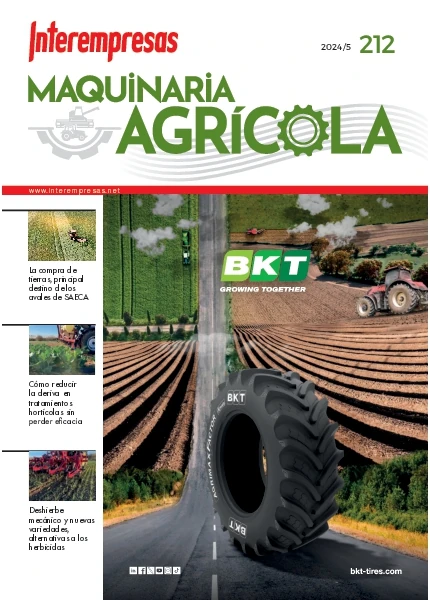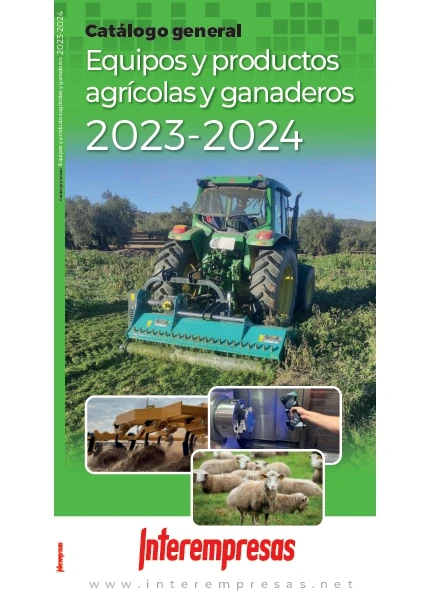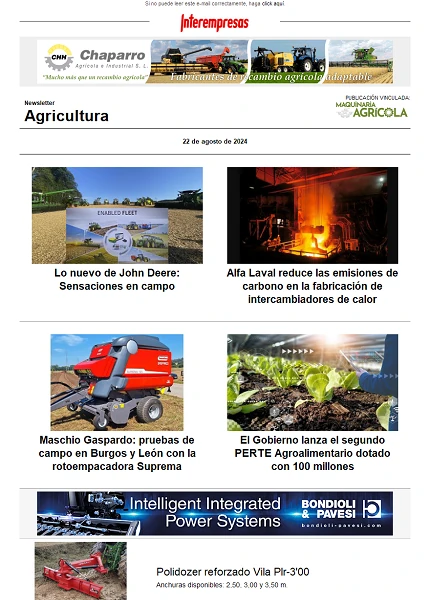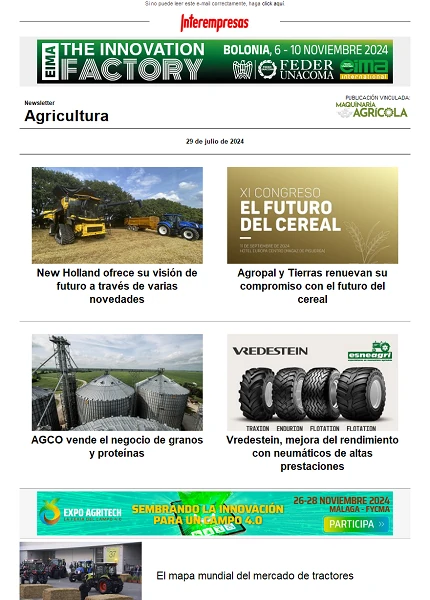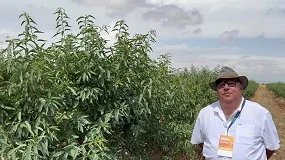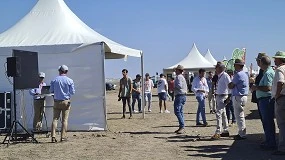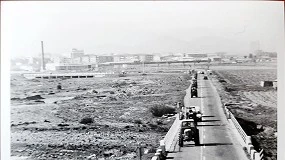In the key of opinion: in defense of realism
September 8, 2008
Agricultural machinery manufacturers are investing much time and budget on research and development to produce a product that offers maximum yields and with a competitive price. But the fulfillment of every day more restrictive legislation threatens this balance.
With the arrival to the EU of a new approach in legislation, by which European directives were to be binding, leaving the technical standards at a secondary level, are masked main interest: give priority to the technical requirements laid down in the European Union to third countries. In this way promoted and agreed international technical standards lost value against the specifications set out in any place in the European Union.
Standardization is philosophy of starting the search for common solutions that are valid, and safe for manufacturers from all over the world, and to do so is established as a forum for Exchange of ideas which can involve all stakeholders of each participating country, from groups of users to its central administration. And this is demonstrated when a new proposal for standard is suggested by a laboratory, a University, a manufacturer or even a group of users.
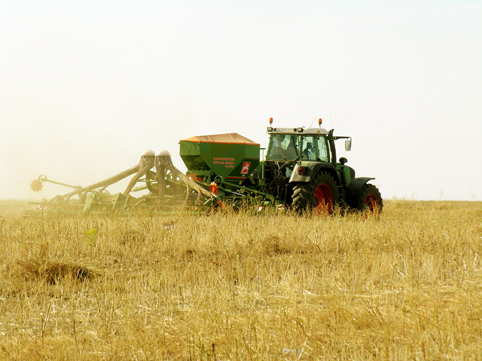
Each participating Member can access the working documents and make the appropriate comments, so that everyone can study the opinions of all and thus there is a global exchange of ideas. The objective is to find solutions to problems and go adapting and improving these solutions according to the needs of each moment.
On the other hand, it is legislation or regulations whose reason being is force to observe something at a given time. What must be met is difficult to change, however the moment in which there are to comply with it is negotiable. Always have suspicion of what comes out, and if it is also preceded the words "European directive", moreover. The first thing that is read from the text is when established its entry into force; If several years the reader inspired so ineffectual little. This will be the moment in which we will know what is what must be met and will be necessary to adapt to change extension.
The disregard is relative, for it is the manufacturers, who are the first affected by the changes, confident that just as they have appeared new demands, they disappear, but don't forget. No one knows who decides what is what is going to impose in a few years, and we are not talking about trends but obligations.
Common and realistic solutions
We are no longer talking about solutions, but look for problems. With the normalization seeking solutions with legislation and common problems. It is clear that the legislation seeks equality for everyone on a mandatory basis, but this search would be really good provided that what should be requested to have a realistic basis. To ask for something we need to know about what is being asked, and frankly, it is entirely unclear whether legislators know in depth the matters which are regulated.
It would be interesting to conduct a comparative study to verify the real scope of the requirements laid down by European legislation, both from the point of view of the worker safety and the protection of the environment. In other words: should be objectively analyse whether the legal requirements are really necessary, that is, if they help to reduce risks (labour and environmental) in a degree such that would justify the increase in costs involved in adapting to them.
Agricultural machines are really complex and have a great variability to be able to adapt to all media in those who go to work. This feature makes the agricultural machinery special both to be considered as work equipment or vehicles.
Its design is special, its manufacture is special and its marketing is special. Therefore the legal specifications for these machines should be special, however the European Union remains committed to harmonize these requirements with those of the rest of vehicles and machines, without taking into account the great differences between them.
European legislation aims to protect mainly in the area of occupational risk to European citizens by providing them equipment that are secure, so that any machine that is marketed in community ground meets minimum security requirements.
The accession of a country to the European Union is to comply with European legislation, but it is also necessary to know this legislation to be able to export products to the EU. The Community directives are alive, and thus grow, develop and some die. During development they suffer various changes, some adaptation to technical progress and another restrictive emerged by interests of unknown origin.
Amendments to the adaptation to technical progress are supported in standardization, which is mainly made according to the contributions of the manufacturers and users. At this point, we distinguish the international standardization of the ISO (International Standardization Organization) Agency and the European of the CEN (European Committee for standardisation). The rules are not mandatory until European legislation so provides, and the legislation of the EU only takes into account European standards (which incidentally should be taken by each Member State and translated into their mother tongue). The European requirements can be more or less easily international, but the reverse process is far more complicated. Proposals for adaptation to European standardisation must be reviewed by outside consultants which establish compliance or not with the legislative requirements and are often denied.
This complicated situation determines that European legislation has become a very fine filter, to the extent that presents problems even for the European manufacturers themselves when it comes to marketing in third countries. Products must comply with excessive regulations and your marketing is not competitive with the rest of the world. There are discrimination even within the EU, in such a way that does not take account of the variability from one Member State to another. All must meet the same, although for some it is more simple that for other.
Security and usability
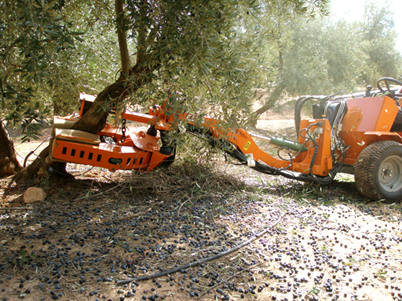
All workers must be protected in their places of work, but more emphasis on increasing the training in the integration of security in the design phase of the machines to do more complicated should be. Currently the agricultural machines that are marketed in the European Union are subject to so many specifications of safety, quality and environment, it is sometimes impossible to get to the point of balance between utility and legality, i.e. a machine has to comply with so many security measures that will come the moment that can not touch the machine. At least it is developing the Galileo system, which will allow the machine to work without operator; Maybe then, after having diverted all attention to the electronics, it will import both security and machines can work again as before.
Despite all the legislation increasingly promoted perhaps by those countries where there are no virtually manufacturers continues complicating and enough time to bureaucratised everything. What has become clear in recent years is that those who cannot provide nothing for the common benefit are dedicated to slow down development of standards and legislation procedures.
In parallel with the legislation in the field of security, which is more linked to normalization, appears on the environment and traffic legislation. In this case the origin of the problem is different, but the result for the manufacturer is once again the same: the obligation to adapt to the continuous changes and the particularities arising depending on the area chosen for the marketing of their products.
They write, study and publish directives with which seeks to reduce the emissions of gaseous pollutants, noise and harmful vibrations to man; but in these works forgets to enter the particular factors of agricultural machinery. The total volume of machines running at the same time is not so considerable risk for the pollution of the atmosphere as the caused by another type of vehicle; in the measurement of the noise are considered by same tractors with or without cabin, for some lawmakers there are not devoid of cabin and narrow tractors and, finally, the established methods of measurement of vibration are not applicable and valid for certain agricultural machinery based on the ground that they are working.
The philosophy of the EU is the approach of European countries and the free movement of goods, but there are still barriers to the movement of vehicles between Member States. A good example are the specifications for maximum masses, dimensions, lights, signals, devices of braking, etc., which vary from one place to another, even within the same country.
Manufacturers and legal representatives should be continually pending the evolution of the legislation to be ready before future requirements and any change of direction in the procedures of legalization of their products. In this sense, one of the latest changes in the EU has been the application of the machine safety directive to wheeled agricultural tractors, which have been exempt for one simple reason: the process of approval which must be from makes three decades covers virtually all of the risks set out in that directive and even in some cases, it is more restrictive.
Thirty years ago appeared the first directive applicable to agricultural tractors. Ago 20 began to speak of European directives in Spain. Just a decade joined two associations more strong in the sector of agricultural machinery in Spain. Since we are working to find common solutions to all manufacturers. As it has been explained, each year come new challenges to face and Ansemat will be at the service of the sector to overcome them.


